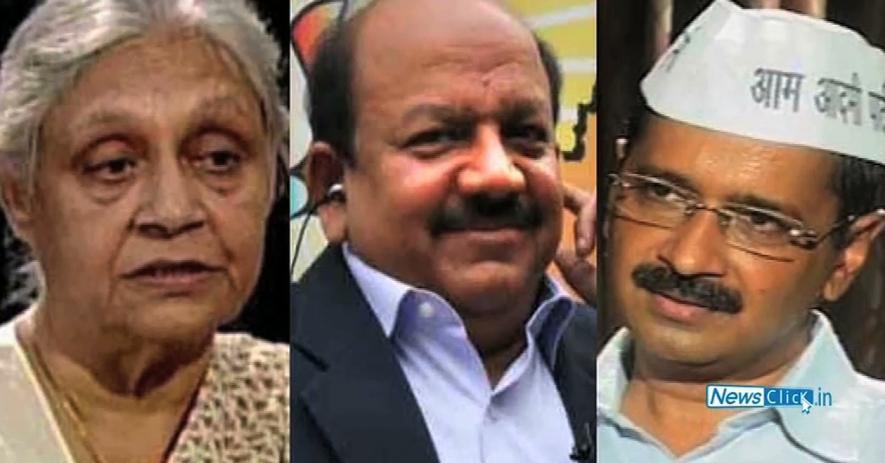Congress Over but no Modi Wave
The Assembly elections are over, the results out, and the introspection and analysis on. The first message from the polls in Delhi, Rajasthan, Madhya Pradesh and Chhatisgarh is that the Congress party is over and out. The anger and resentment of the people against the Congress is overwhelming, and expressed itself in a vote that decimated the party completely. The second message is that the people are looking for a credible alternative, and if given one as in Delhi, will reject the old hat for the new without hesitation.
In other words, the Indian voter has recognized honesty, integrity and sincerity as a virtue and has embraced the Aam Aadmi Party as a result in Delhi. The third message is that despite the efforts by industry and its media to establish a Narendra Modi wave in these state elections, the voters have shown no such desperation and have voted for what they felt was closest to their respective aspirations.

The wave in Delhi was actually for AAP, and became very visible the day before polling when the entire city was buzzing with stated preferences for the new party. The media, obsessed with manufactured exit polls, chose to ignore this and instead of relying on convention street reportage preferred to go with the supplied---and dare one say created---statistics. Arvind Kejriwal and his team won 28 seats in a first debut that made it very clear that it was not AAP that had emerged as the spoiler but the Congress. In fact, if those who voted for the Congress had been a little more confident and a little less suspicious of the new party, AAP would have bridged the gap and crossed the half way mark to form the government.
It must be remembered, although of course media memory is regrettably short, that Modi had targeted Delhi through huge public meetings through the run up to the polls. In what could be described as an attempt at carpet bombing he addressed mega rallies through Delhi in the last days of the campaign to help BJP sweep the opposition, and come to power with a good majority. This has not happened, and the BJP march forward has been halted at 32 seats, four less than required to form the government. Clearly Delhi, a city that the BJP has always really regarded its own, was not mesmerized by Modi and decided not to give him a state government despite his fervent pleas for the same. In other words, Modi and his party were unable to create a wave, and Delhi with its urban middle class and poor voted Aap in what the BJP no doubt construes as alarming proportions.
In fact Modi was unable to change the outcome of any state really. BJPs Vasundhara Raje had turned the tide in her favour in Rajasthan long before Modi began his campaign there. Complete disillusionment with the Congress government united the people behind the only other available option, Scindia and the BJP. It was clear from several months that the party was facing a rout in the state, and Modi might have added to the numbers but certainly had little to do with the electorate’s decision. Similarly in Madhya Pradesh, the reputation of BJP chief minister Shivraj Chouhan was further enhanced by the incompetence of the Congress party that remained bitterly divided through the campaign. Modi might have helped increase the statistics of victory, but certainly did not influence a foregone conclusion.
Chhatisgarh remains a state where both Modi and Sonia Gandhi can insist that they helped contain the other. But again the voting pattern really does not bear this out, as neither was Modi able to help decimate the Congress and nor was Sonia Gandhi able to wrest the state from the BJP. Again no signs of a wave, with Chhatisgarh witnessing a hard political battle for the seats. It must be remembered that here too, like Rajasthan and Madhya Pradesh, the contest was between the BJP and the Congress with no other alternative in the picture. It is thus, totally wrong to interpret the results as a victory for Narendra Modi. It is a victory, no doubt, for the BJP and its leaders in the state, aided by a totally ineffectual Congress and the absence of a third alternative.
Therefore and rather ironically, it is Delhi that provides some very interesting political indicators that can be loosely translated as political messages for the national elections:
One, in a straight contest between the BJP and the Congress, the former would have swept the polls. As is visible in the other states like Rajasthan and Madhya Pradesh.
Two, the Congress is history for not just now, but for a longer while given the beating it has got from an electorate that does not forgive easily. There is a pan India anger against the party that is no longer seen by the voters as an answer to their aspirations.
Three, a credible alternative for change makes sense to the frustrated, angry, hapless and hopeless voter who is fed up with price rise, corruption, divisiveness and is no longer shy of alternatives. This is reflected in the excellent performance of AAP in a city like Delhi that had always rejected other alternatives in the past.
In other words, there is space for emerging alternatives that carry levels of credibility. In Delhi the voters without prior consultation rushed to vote AAP, without bothering to check out its candidates, without any surety that the party would actually do so well and without any assurances about AAP's future course of action. This does indicate a level of desperation translated by the Delhi voter into a strong desire for change that, clearly Narendra Modi’s campaign was unable to address. The BJP has taken serious stock of this, the first sign being its reluctance to indulge in horse trading to get the three to four seats required to form the government in Delhi. Despite being so close to power, the BJP is perforce having to relinquish its ambitions and actually support Presidents rule until fresh elections can be held with the Lok Sabha elections in all probability, for a clearer mandate. Interestingly, the Delhi voters seem to be quite satisfied with their verdict with no murmurings from any quarter about having to poll again. The same Delhi that does not like to vote once, let alone twice.
Disclaimer: The views expressed here are the author's personal views, and do not necessarily represent the views of Newsclick
Get the latest reports & analysis with people's perspective on Protests, movements & deep analytical videos, discussions of the current affairs in your Telegram app. Subscribe to NewsClick's Telegram channel & get Real-Time updates on stories, as they get published on our website.
























